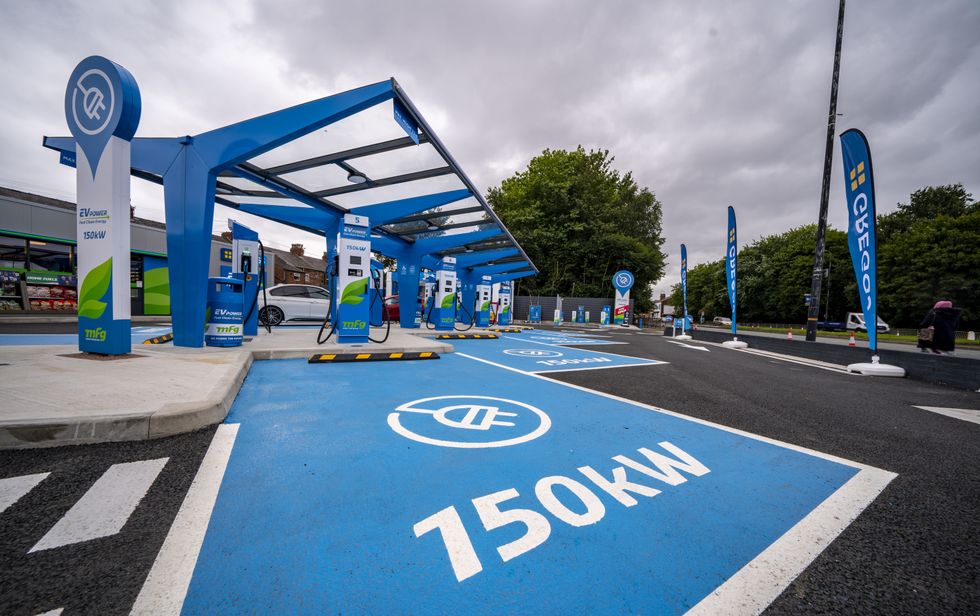Rachel Reeves to slap drivers with £2k car tax increases next year with three in five motorists impacted

Electric car drivers have been warned they face a new £2,125 luxury vehicle tax from April next year, in a move which could risk conflicting with the UK’s net-zero ambitions.
The additional levy, known as the expensive car supplement, will apply to all electric vehicles priced above £40,000.
Electric vehicles had previously enjoyed an exemption from this charge since 2020 but plans to bring them back into the tax fold are now moving forward.
The hefty surcharge comes as part of wider changes to car tax announced in the recent Budget, where Rachel Reeves revealed a £1.6billion raid on motorists.
Do you have a story you’d like to share? Get in touch by emailing motoring@gbnews.uk

While electric vehicles will pay lower standard road tax rates than petrol cars, the luxury supplement will hit the majority of new EVs due to their typically higher purchase prices.
The £425 annual surcharge must be paid between the second and sixth years of a car’s lifespan, totalling £2,125 over the period. The levy applies even if the vehicle changes ownership during this time.
This tax comes in addition to standard Vehicle Excise Duty (VED), which is also changing from April for all vehicles. Electric car owners will begin paying £10 in traditional road tax for their first year, followed by a standard yearly rate of £190 thereafter.
The £40,000 threshold that triggers the luxury supplement is based on a car’s list price including optional extras, regardless of any negotiated discounts. But reports suggested that if the threshold rose with inflation since its 2017 introduction, it would now stand at £51,827.
Auto Trader figures revealed that 67 per cent of electric vehicles exceed the £40,000 threshold, meaning a significant portion of drivers will now face the luxury supplement.
The impact could be substantial, with 300,000 electric motors already purchased in the UK this year, according to the Society of Motor Manufacturers and Traders.
The UK’s most popular electric vehicle, the Tesla Model Y, starts at £46,990, well above the tax threshold.
Manufacturers have been reducing prices to boost sales, yet the average cost of an electric vehicle remains above the £40,000 mark.
While 37,000 more EVs have hit the road in 2024 compared with last year, they only represent 18 per cent of the new car market.
This falls below the Government’s zero-emission vehicle mandate of 22 per cent, which is set to increase to 28 per cent next year. Industry experts have warned about the policy’s potential impact on electric vehicle adoption.
Steve Brown of tax firm RSM explained that the introduction of higher taxes on electric car purchases “may well be counter-productive” and “appears at odds” with the Government’s ambitious plans to reduce the country’s carbon emissions.”
Meanwhile a Treasury spokesman told The Telegraph: “From April 2025, electric cars will begin to pay VED in a similar way to petrol and diesel cars, ending the exemption for electric cars from the expensive car supplement.”
He added that zero-emission cars already come with premium price tags, and “some may feel they are paying a penalty for trying to do the right thing.” Auto Trader’s Ian Plummer expressed disappointment that Labour has not revised the luxury car policy.
He commented: “The changes to VED promoting lower emission vehicles in the recent Budget announcement is exactly the kind of government action we need to see more of, so it’s a shame, when we’re aiming for a fair and equal transition, the expensive car supplement hasn’t seen such treatment.“
LATEST DEVELOPMENTS:
- Floodgates open on £18bn car finance scandal with drivers set to receive huge payouts amid biggest crisis to date
- DVLA warned of urgent ‘reforms’ as classic car owners risk being ‘trapped in a spiral of uncertainty’
- Older motorists reject plans to use self-driving vehicles within years despite ‘reducing human error’

But the Government acknowledged the levy will have a “disproportionate impact” on electric car buyers from April.
Officials said they will consider raising the threshold for zero-emission cars at a future fiscal event, though no timeline has been specified.

